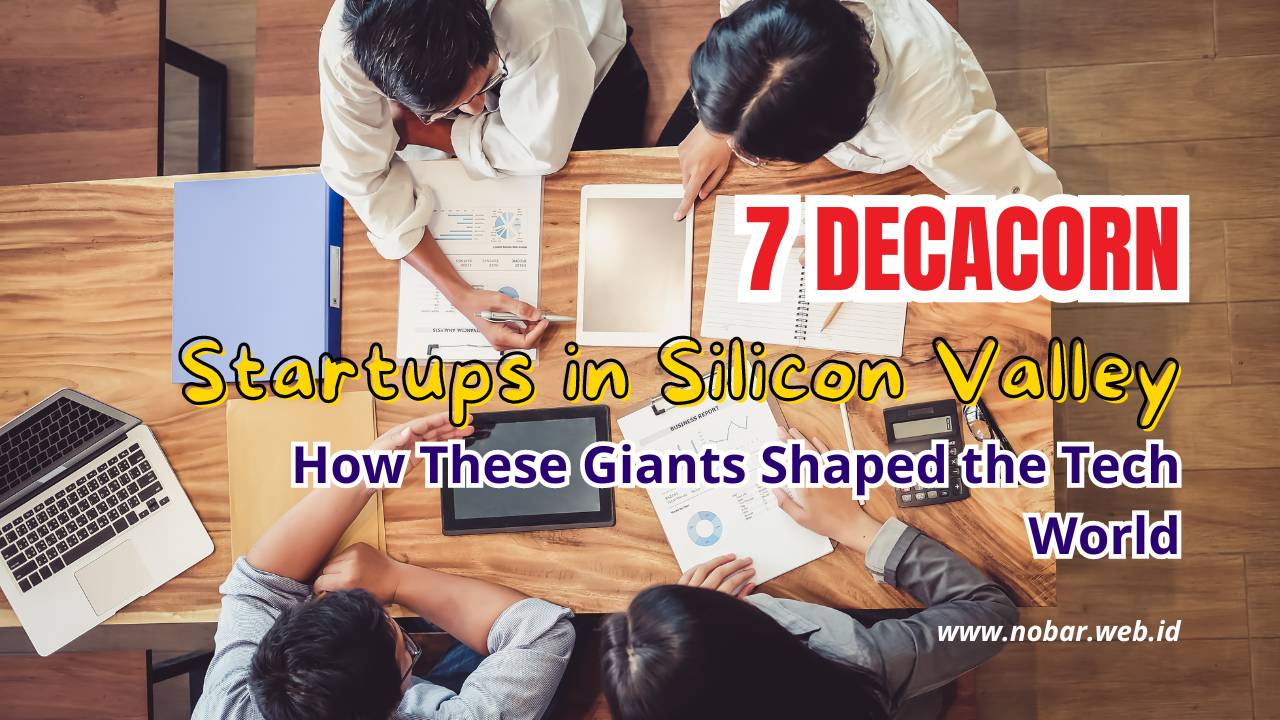Silicon Valley is home to some of the world’s most innovative startups, and among them, a select few have reached the prestigious decacorn status. A decacorn is a startup valued at over $10 billion, a rare achievement in the world of business. These companies have not only managed to disrupt industries but also set new trends in technology, creating ripple effects that are felt worldwide.
In this article, we’ll explore seven of the most influential decacorns based in Silicon Valley, examining their growth journeys, key innovations, and how they have shaped the tech ecosystem. If you’re a startup founder, investor, or simply interested in the world of tech, understanding these companies will give you insight into what it takes to become a decacorn.
What is a Startup and What Defines a Decacorn?
Before diving into specific examples, it’s essential to understand what a startup is and what sets a decacorn apart from other companies.
Startup Definition
A startup is a newly established business that aims to solve a problem or meet a need through innovation, often in the tech industry. Startups are typically in their early stages and focus on rapid growth to establish themselves in the market.
What is a Decacorn?
A decacorn is a term used to describe a privately held startup company with a valuation of more than $10 billion. It’s an evolution of the term “unicorn,” which refers to startups valued at over $1 billion. Decacorns are much rarer and represent only the most successful and disruptive startups.
The Rise of Decacorn Startups in Silicon Valley
Silicon Valley has long been the epicenter of innovation, with countless startups emerging from the region. However, only a handful have achieved decacorn status, standing out due to their groundbreaking products, immense growth, and market leadership. These companies have not only achieved high valuations but have also become household names, influencing industries from finance to transportation.
Let’s dive into the seven most iconic decacorn startups from Silicon Valley:
1. Uber Technologies
Valuation: $60+ billion
Industry: Ride-hailing, Transportation
How They Became a Decacorn
Uber revolutionized the transportation industry by offering an on-demand ride-hailing service that connects riders with drivers through a mobile app. Founded in 2009, Uber grew rapidly by expanding to cities around the world, tapping into a previously underserved market. The company’s ability to scale quickly and adapt to different markets made it one of the earliest decacorns in Silicon Valley.
Key Innovations
- On-demand ride-hailing
- Expansion into food delivery with Uber Eats
- Autonomous vehicle research and development
2. Airbnb
Valuation: $30+ billion
Industry: Travel, Hospitality
How They Became a Decacorn
Airbnb disrupted the traditional hospitality industry by allowing people to rent out their homes or spare rooms to travelers. What began as a small idea for extra income turned into a global phenomenon. Airbnb’s platform now offers millions of listings across 220 countries, making it one of the largest accommodation providers worldwide—without owning a single hotel.
Key Innovations
- Peer-to-peer lodging rentals
- Experiences and guided tours integrated into the platform
- Focus on community-driven travel experiences
3. Stripe
Valuation: $95+ billion
Industry: Fintech, Payments Processing
How They Became a Decacorn
Stripe is a financial services and software company that provides an infrastructure for online payments. Founded in 2010, Stripe quickly became the go-to platform for businesses looking to accept online payments, including giants like Amazon, Google, and Shopify. Its ability to offer seamless payment solutions across borders catapulted Stripe to decacorn status.
Key Innovations
- Easy-to-integrate payment gateways
- Fraud prevention systems
- Advanced developer tools for fintech solutions
4. Palantir Technologies
Valuation: $20+ billion
Industry: Data Analytics, Software
How They Became a Decacorn
Founded in 2003, Palantir specializes in big data analytics, providing software platforms for organizations to analyze vast amounts of data for decision-making. Palantir’s services are highly sought after by government agencies and large corporations, particularly in sectors like defense, intelligence, and finance.
Key Innovations
- Big data analysis tools for complex datasets
- Secure platforms for sensitive government and business data
- Advanced machine learning applications in data interpretation
5. DoorDash
Valuation: $20+ billion
Industry: Food Delivery
How They Became a Decacorn
DoorDash transformed the food delivery landscape by enabling restaurants to deliver meals to customers without managing their own delivery operations. Launched in 2013, DoorDash saw rapid growth due to its user-friendly platform and partnerships with local restaurants. It became especially popular during the COVID-19 pandemic when food delivery surged.
Key Innovations
- User-friendly food delivery platform
- Subscription services for regular customers (DashPass)
- Expansion into grocery delivery
6. Robinhood
Valuation: $11+ billion
Industry: Fintech, Stock Trading
How They Became a Decacorn
Robinhood shook up the financial world by offering commission-free stock trading, making investing accessible to a broader audience. Since its launch in 2013, Robinhood has attracted millions of users, particularly young, first-time investors. Its mission to democratize finance and its straightforward app interface played a significant role in its decacorn valuation.
Key Innovations
- Commission-free stock trading
- Easy-to-use mobile app for investments
- Cryptocurrency trading options
7. SpaceX
Valuation: $100+ billion
Industry: Aerospace, Space Exploration
How They Became a Decacorn
Founded by Elon Musk in 2002, SpaceX is pioneering commercial space travel. It became a decacorn by developing reusable rocket technology, which significantly reduced the cost of space missions. SpaceX has since been contracted by NASA and other agencies for space exploration, and it has plans for future missions to Mars.
Key Innovations
- Reusable rockets
- Private space missions and launches
- Starlink satellite internet service
Why Decacorns Matter in the Startup World
Decacorns aren’t just large companies with high valuations; they are innovators that change industries and create new markets. These companies have reached extraordinary heights by identifying opportunities that others have missed and scaling quickly to capture market share. In the process, they also inspire future entrepreneurs and startups.
The success of decacorns also reflects the health of the startup ecosystem in Silicon Valley. Venture capital investment, a highly skilled workforce, and a culture of innovation all contribute to the success of these companies. Decacorns serve as benchmarks, showing other startups that reaching a $10 billion valuation is achievable with the right combination of product-market fit, scalability, and innovation.
FAQ: Frequently Asked Questions about Decacorns and Startups
1. What is a decacorn?
A decacorn is a privately held startup valued at over $10 billion. It is a term used to describe companies that have reached a higher valuation than unicorns, which are valued at over $1 billion.
2. How does a startup become a decacorn?
A startup becomes a decacorn through rapid growth, innovation, and attracting significant venture capital investment. These companies typically disrupt industries, scale globally, and achieve high market valuations.
3. Are all decacorns tech companies?
While most decacorns are in the tech industry, focusing on areas like fintech, transportation, and software, the term can apply to startups in any industry, as long as they achieve the $10 billion valuation threshold.
4. How do decacorns differ from unicorns?
Unicorns are startups valued at over $1 billion, while decacorns are startups valued at over $10 billion. Decacorns are rarer and have reached a more advanced stage of growth than unicorns.
5. Why are most decacorns located in Silicon Valley?
Silicon Valley offers access to venture capital, a highly skilled workforce, and a culture of innovation that fosters the growth of startups. This environment makes it easier for companies to scale rapidly and attract the resources needed to achieve decacorn status.
6. What role do venture capitalists play in the success of decacorns?
Venture capitalists provide the financial backing and strategic guidance that allow startups to grow rapidly. Many decacorns have received significant funding from venture capital firms, which helps them scale and achieve their high valuations.
7. Can a decacorn go public?
Yes, decacorns often go public through an initial public offering (IPO). Going public allows the company to raise additional capital, and investors can sell their shares on the stock market.
8. What are some risks of investing in decacorns?
While decacorns have achieved significant growth, they are not immune to risks. These include market competition, regulatory challenges, and potential overvaluation. Investors need to assess these risks before investing in such companies.
Decacorns as the Future of Innovation
The seven decacorns we’ve explored—Uber, Airbnb, Stripe, Palantir, DoorDash, Robinhood, and SpaceX—are not only remarkable for their valuations but also for the innovations they’ve brought to their respective industries. These startups serve as prime examples of what is possible when entrepreneurship, innovation, and capital come together.
For entrepreneurs aiming to grow their own startups, decacorns offer a blueprint for success. With the right idea, team, and investment, any startup can dream of reaching the $10 billion milestone and beyond. Whether you’re an aspiring founder or an investor, the stories of these decacorns highlight the incredible potential within the startup ecosystem.



